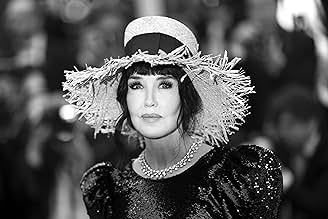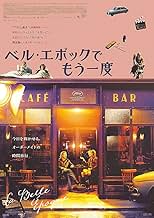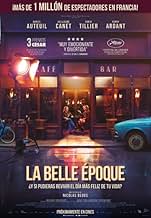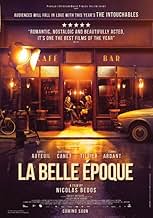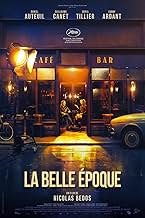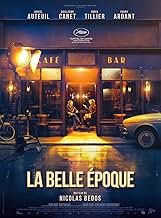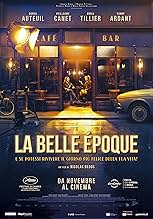La belle époque
- 2019
- Tous publics
- 1h 55m
IMDb RATING
7.4/10
21K
YOUR RATING
Victor, a disillusioned 60-something whose marriage is on the rocks, opts to relive the week of his life when, 40 years earlier, he met his true love through a company that allows customers ... Read allVictor, a disillusioned 60-something whose marriage is on the rocks, opts to relive the week of his life when, 40 years earlier, he met his true love through a company that allows customers to return to the time period of their choosing.Victor, a disillusioned 60-something whose marriage is on the rocks, opts to relive the week of his life when, 40 years earlier, he met his true love through a company that allows customers to return to the time period of their choosing.
- Awards
- 6 wins & 22 nominations total
Bruno Raffaelli
- Maurice
- (as Bruno Raffaelli de la Comédie Française)
- …
- Director
- Writer
- All cast & crew
- Production, box office & more at IMDbPro
Featured reviews
My own personal 'Belle Époque' would have been my student days in the late 60s, most especially '69, when I fell amazingly in love, so I was 5 years ahead of Victor, but I can so much identify with the nostalgia, and the desire to go back. Indeed, I often visit those days in my dreams, with the sort of distortion of events that only dreams can do. So if I could pay to be magically transformed completely to 1969, to live its fabulous intensity all over again, only my bank balance would hold me back.
To return to relive a time when the world lay ahead of me, everything seemed possible, and I was not old and cynical, now wouldn't that be marvellous?
It is so refreshing to watch a movie that involves genuine acting, and Daniel Auteuil is magnificent, as always, his eyes alone capable of expressing so much emotion.
And it sets 21st century and possibly futuristic technology against a backdrop of 1974, when life really was all so much simpler.
The movie does at times become dream-like in its depiction of Victor's recreation of his youthful journey, and most certainly surreal, definitely bewildering in places for him, and the whole story is cleverly handled with wit and elegance.
Well worth seeing, and I will give it a faultless 10/10
La Belle Époque poses the interesting question of which moment of your life you'd want to relive (if any). Victor Drumond (Daniel Auteuil), an aging cartoonist with a failing marriage with his wife Marianne (the elegant Fanny Ardant), definitely has one.. one where he first met the love of his life (Marianne, of course!). When Victor gets chucked out of their apartment one night by Marianne, he decides to make use of the voucher offered by his son to "return to his glorious '70s". This is made possible by Antoine (a childhood friend of his son's), who along with a bunch of sophisticated actors and authentic aesthetics (akin to elaborately done film sets), offers a service to let people relive their happiest moment(s).
Antoine (Canet) is going through a relationship struggle with Margot (a tough-to-take-eyes-off Doria Tillier), one of his actresses. When Margot is cast to play the role of Marianne in Victor's moment re-enactment (set in a cafe in Lyon, 1974), things slowly spiral out of control. Victor can't help but fall in love with this beautiful, trailblazing lady (who improvises her lines and situations) for real. In her, he sees traits of his wife, but with unique texturing of her own. As days progress, Victor finds that he's able to draw (i.e. create art) again.
Nicolas Bedos strongly projects how art is one of the few things that can stand the test of time - sometimes, even love tends to take a backseat. He also leaves a heartwarming message (for everyone who's been in love at some point) in the form of the climax scene. It's a nostalgia-filled ride too, into an imagined version of the 70s. Victor casually comments on the times when people used to smoke like they owned chimney lungs and notice other people passing by instead of staring into phone screens (like we do now!).
Plenty of sharp, cleverly written humor is also present for discerning viewers. Bedos can feel proud of the fact that he didn't overly sentimentalize the proceedings or overuse his unique rom-com concept. The writing here for each of the lead characters is solid and very Kaufman-esque in its world-building. I, for one, would love to visit Utopia as many times as possible. Also, I feel uber tempted to check out Doria Tillier's other works ASAP!
Antoine (Canet) is going through a relationship struggle with Margot (a tough-to-take-eyes-off Doria Tillier), one of his actresses. When Margot is cast to play the role of Marianne in Victor's moment re-enactment (set in a cafe in Lyon, 1974), things slowly spiral out of control. Victor can't help but fall in love with this beautiful, trailblazing lady (who improvises her lines and situations) for real. In her, he sees traits of his wife, but with unique texturing of her own. As days progress, Victor finds that he's able to draw (i.e. create art) again.
Nicolas Bedos strongly projects how art is one of the few things that can stand the test of time - sometimes, even love tends to take a backseat. He also leaves a heartwarming message (for everyone who's been in love at some point) in the form of the climax scene. It's a nostalgia-filled ride too, into an imagined version of the 70s. Victor casually comments on the times when people used to smoke like they owned chimney lungs and notice other people passing by instead of staring into phone screens (like we do now!).
Plenty of sharp, cleverly written humor is also present for discerning viewers. Bedos can feel proud of the fact that he didn't overly sentimentalize the proceedings or overuse his unique rom-com concept. The writing here for each of the lead characters is solid and very Kaufman-esque in its world-building. I, for one, would love to visit Utopia as many times as possible. Also, I feel uber tempted to check out Doria Tillier's other works ASAP!
I really enjoyed watching this movie. It's fresh and keeps the viewers well connected with the characters. Exceptional acting. It makes the viewer appreciate the true power of performing a movie within a movie. A clever script, in my oppinion, with a blend of old and new to match. For me, though, it would've been even more gripping if the reenactment had taken place at Marianne's request, rather than Victor's choice. That way, he could've been unaware of everything going on behind the scene, so they can relive their happiest moments, as an attempt to save their marriage. Too cliche? Maybe. Anyway, that's just a thought. I like it all the same.
Just saw this film at the VIFF. The opening scene is worth the price of admission and the fast-paced dialogue had me engaged throughout the film. Lots of witty lines and funny gags had the audience laughing. The acting was superb, especially Margot, who had to play her real life role as the director's girl friend and her acting role as Victor's wife in the past. Victor also was excellent playing the down and out jilted husband seeking connection to his past. Overall the tight script and flawless acting makes it one of my favourite movies of the year.
Nicolas Bedos' La Belle Époque has distinctive French flavor and is somewhat old-fashioned.
The film is really light-hearted and is all about love.
And yet it is fascinating and can easily bring you to tears.
Many viewers may recognize Nicolas Bedos in the movies like Love Is in the Air (Amour et turbulences) or Love Lasts Three Years (L'Amour dure trois ans). Still, he is first and foremost a writer and a director, and he is as good at those crafts as in the romantic films being an actor.
His new film combines drama and comedy, restraint and passion, romance and real life.
The main characters of the film are Victor, an illustrator, and Marianne, a psychologist. Both of them are not young, but have completely different outlooks. Victor is stuck somewhere in the distant past, whereas his wife Marianne still wants to take more from life.
The film constantly maintains a fast emotional pace. The tension becomes palpable. The relationships of the couple are on the verge of collapse. They are drifting apart being constantly annoyed. It seems that they just do not want to be close any more, but they might as well not realize how much they really want to be together. Nobody wants to concede and they have to decide whether they are moving on together or separately.
Perhaps, when everything goes wrong it is worth recalling how it used to be. What were you like, what were you both like? In such a way you might revive some stimulating ideas, your love or just find yourself. The only thing you need is a small push.
Victor has got a chance to check it out. His son gave him a present - an incredible journey into the past. He can choose any era and the team of professionals will transfer him to the chosen place and time.
The puppeteer of the business which aims at bringing hope is Antoine (Guillaume Canet). He is a sheer perfectionist who creates authentic historical installations where you can meet Napoleon, Maupassant, or even your own deceased father.
Such an expert would surely have been welcomed in the Ridley Scott's crew when filming Gladiator or Quentin Tarantino's crew when making Inglourious Basterds. However, taken into account Antoine's temper, they would probably have not got along. Just like Antoine's team can hardly stand his annoying behavior.
Antoine is ready to fulfill any of Victor's whim. The latter has chosen to travel back in time into his own past, namely the day he met the love of his life. It was the time when he was breathing freely; he was drawing and was the person he wanted to be.
Someone might find such choice a bit weird. Nevertheless, the main hero has made a decision to live his life again, to make up for the lost time. And the big game starts.
At first, Victor is amused by small inaccuracies of what is going on around him. However, in some time he becomes engrossed into this fictitious world. A completely innocent, at first glance, the game grows into something much bigger.
Victor changes. A fire lights up in his eyes again. He starts a struggle with himself without being fully conscious of that.
Leading this fight you need to stop in time and understand that whiskey is not as tasty as it could be because instead of it you are drinking water. Love is present not only in that one specific day, but it is also inside us.
In La Belle Époque, the characters quarrel and reconcile, love and hate, admire and despise. Despite that, love is prevalent in the given chain of emotions. It is the key even if you need to create the whole new world to save or find it.
The film is really light-hearted and is all about love.
And yet it is fascinating and can easily bring you to tears.
Many viewers may recognize Nicolas Bedos in the movies like Love Is in the Air (Amour et turbulences) or Love Lasts Three Years (L'Amour dure trois ans). Still, he is first and foremost a writer and a director, and he is as good at those crafts as in the romantic films being an actor.
His new film combines drama and comedy, restraint and passion, romance and real life.
The main characters of the film are Victor, an illustrator, and Marianne, a psychologist. Both of them are not young, but have completely different outlooks. Victor is stuck somewhere in the distant past, whereas his wife Marianne still wants to take more from life.
The film constantly maintains a fast emotional pace. The tension becomes palpable. The relationships of the couple are on the verge of collapse. They are drifting apart being constantly annoyed. It seems that they just do not want to be close any more, but they might as well not realize how much they really want to be together. Nobody wants to concede and they have to decide whether they are moving on together or separately.
Perhaps, when everything goes wrong it is worth recalling how it used to be. What were you like, what were you both like? In such a way you might revive some stimulating ideas, your love or just find yourself. The only thing you need is a small push.
Victor has got a chance to check it out. His son gave him a present - an incredible journey into the past. He can choose any era and the team of professionals will transfer him to the chosen place and time.
The puppeteer of the business which aims at bringing hope is Antoine (Guillaume Canet). He is a sheer perfectionist who creates authentic historical installations where you can meet Napoleon, Maupassant, or even your own deceased father.
Such an expert would surely have been welcomed in the Ridley Scott's crew when filming Gladiator or Quentin Tarantino's crew when making Inglourious Basterds. However, taken into account Antoine's temper, they would probably have not got along. Just like Antoine's team can hardly stand his annoying behavior.
Antoine is ready to fulfill any of Victor's whim. The latter has chosen to travel back in time into his own past, namely the day he met the love of his life. It was the time when he was breathing freely; he was drawing and was the person he wanted to be.
Someone might find such choice a bit weird. Nevertheless, the main hero has made a decision to live his life again, to make up for the lost time. And the big game starts.
At first, Victor is amused by small inaccuracies of what is going on around him. However, in some time he becomes engrossed into this fictitious world. A completely innocent, at first glance, the game grows into something much bigger.
Victor changes. A fire lights up in his eyes again. He starts a struggle with himself without being fully conscious of that.
Leading this fight you need to stop in time and understand that whiskey is not as tasty as it could be because instead of it you are drinking water. Love is present not only in that one specific day, but it is also inside us.
In La Belle Époque, the characters quarrel and reconcile, love and hate, admire and despise. Despite that, love is prevalent in the given chain of emotions. It is the key even if you need to create the whole new world to save or find it.
Did you know
- TriviaThe caged parrot is named "Mesrine", a reference to Jacques Mesrine, a famous French criminal of the 1960s and 70s who repeatedly escaped from prison.
- GoofsAt the hippie party you can hear the song 'Yes Sir I can boogie', which was released in 1977 , not 1974.
- ConnectionsReferenced in Vecherniy Urgant: Fanny Ardant/Alexander Ivanov (2019)
- How long is La belle époque?Powered by Alexa
Details
Box office
- Gross worldwide
- $14,384,206
- Runtime1 hour 55 minutes
- Color
- Aspect ratio
- 2.35 : 1
Contribute to this page
Suggest an edit or add missing content

![Watch Trailer [English SUB]](https://m.media-amazon.com/images/M/MV5BNzc4YzEzNTYtMzVkOC00NDlmLWI0ODItNTliODNlOWRmOGIxXkEyXkFqcGdeQXRyYW5zY29kZS13b3JrZmxvdw@@._V1_QL75_UY281_CR87)
![Bande-annonce Teaser [OV]](https://m.media-amazon.com/images/M/MV5BNjBlOTQyODUtMTRlNi00MjgyLWIxNjYtYjRhMjRhZjMwOTdmXkEyXkFqcGdeQXRyYW5zY29kZS13b3JrZmxvdw@@._V1_QL75_UX500_CR0)

